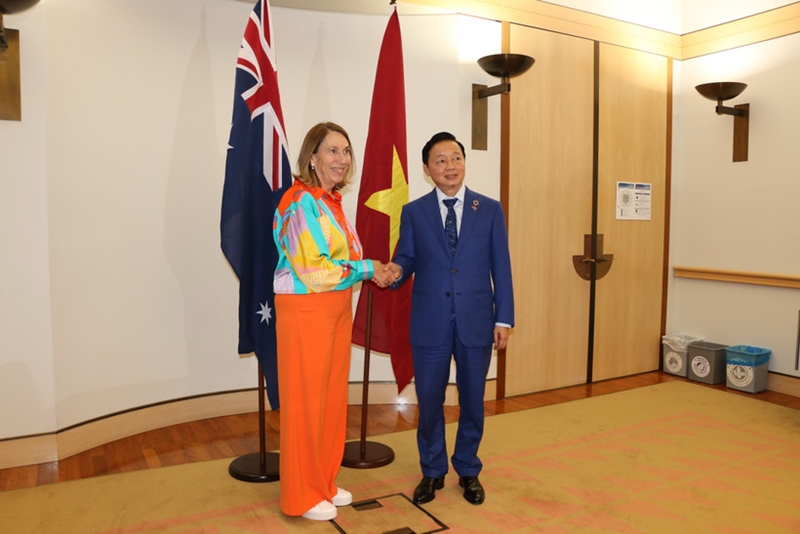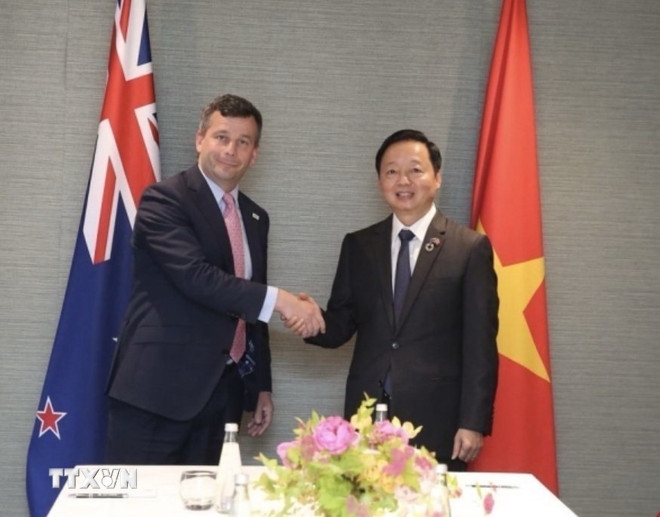In New Zealand, the Deputy PM met with Speaker of the House of Representatives Gerry Brownlee, held talks with Deputy PM David Seymour, met with Minister of State for Trade and Investment and Associate Minister for Agriculture Nicola Grigg, and Minister of Environment Penny Simmons. He also visited the Earth Science New Zealand.
    |
 |
|
Deputy Prime Minister Tran Hong Ha (right) meets with President of the Australian Senate Sue Lines. |
In Australia, Ha held meetings with President of the Australian Senate Sue Lines; Deputy PM and Minister of Defense Richard Marles; Deputy Speaker of the House of Representatives and Chair of the Australia - Vietnam Parliamentarians’ Group Sharon Claydon; and worked with Minister of Resources Madeleine King, Minister of Environment and Water Murray Watt, Assistant Minister of Foreign Affairs and Trade Matt Thistlethwaite, and Assistant Minister of Energy and Climate Change Josh Wilson.
He also met Australia’s Chief Scientist and Director of the Australian Center for International Agricultural Research (ACIAR) Tony Haymet, visited the Australian National University (ANU), and attended the opening of the Vietnam Policy Center at ANU and the Vietnam - Australia Science and Technology Forum, as well as the launch of the VietNEST online Vietnamese language learning platform. He also met with businesses operating in the fields of agriculture and mining.
During the meetings with leaders in both countries, Ha briefed them on recent storms and floods in Vietnam and sought continued support from New Zealand and Australia in overcoming the aftermaths of the natural disasters, as well as in environmental and climate change cooperation.
In response, the New Zealand Government announced an aid grant of 3 million NZD (1.7 million USD), while Australia pledged a total of 3.8 million AUD (2.46 million USD) to support Vietnam's flood recovery efforts.
The senior leaders of both countries highly valued their cooperative relations with Vietnam and highlighted the historical significance of upgrading ties to Comprehensive Strategic Partnerships in March 2024 (Australia) and February 2025 (New Zealand). They welcomed the timely implementation of Action Programs to operationalize these partnerships, encompassing practical and concrete cooperation.
Both sides agreed to actively exchange high-level visits, implement concrete measures to further enhance cooperation in economy, investment, trade, defense, security, tourism, culture, education and training, and foster collaboration between civic and business organizations of the two countries.
The two sides stressed the need for closer economic linkages, more effective trade and investment collaboration, and accelerated the signing of agreements to facilitate market access for each other’s agricultural products, diversify supply chains, and achieve higher trade and investment targets.
    |
 |
|
Deputy Prime Minister Tran Hong Ha (right) and Deputy PM David Seymour |
Ha welcomed enterprises from both sides to strengthen connections, affirming Vietnam’s commitment to create a favorable investment environment for New Zealand and Australian businesses, particularly for high-quality, technologically advanced projects.
He also shared Vietnam’s development priorities in the new era, including strategic infrastructure projects in railways, airports, energy, and digital transformation. The Australian leaders noted increasing interest from Australian investment funds in Southeast Asia, including Vietnam, and plans to expand activities to seize new cooperation opportunities.
The Deputy PM appreciated the roles of New Zealand and Australia in promoting global environmental and climate action, thanking both countries for significant ODA support, including disaster risk reduction, sustainable agriculture, and climate adaptation projects in the Mekong Delta.
Both sides agreed to pursue breakthroughs in science and technology, digital transformation and green transition, agriculture, and climate change adaptation, including sharing experience in developing action programs to reduce emissions and create carbon credit markets.
New Zealand and Australia committed to continue providing financial, technological, and knowledge support for Vietnam to meet international climate commitments, advance energy transition and renewable energy, and develop clean, environmentally friendly mining technologies.
Acknowledging the importance of people-to-people exchanges in strengthening the bilateral ties, the leaders agreed to enhance cooperation in education and training, human resource development, labor, and tourism; support direct flights between the countries; and encourage local administrations and major universities to build stronger connections.
Ha also called on New Zealand and Australia to increase the number of scholarships for Vietnamese students and create favorable conditions for the growing Vietnamese community to live, study, and work in the countries.
Source: VNA